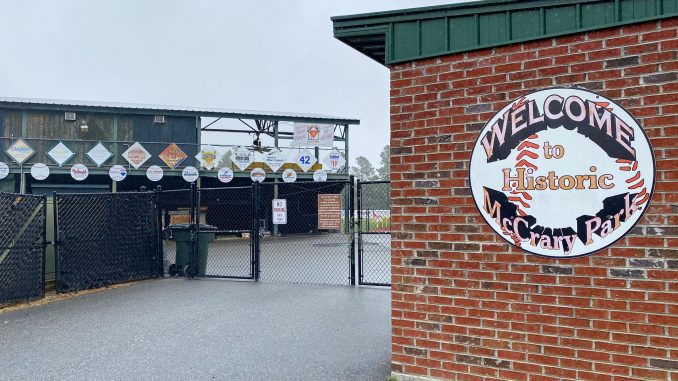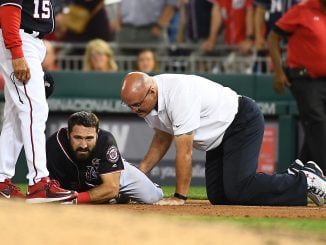
Baseball will be played in North Carolina this summer.
The Coastal Plain League, a college summer wood bat league with eight of its 15 franchises located within the state, has announced plans to begin a condensed 2020 season on July 1 with no or few limitations on the number of fans allowed in the ballpark to watch.
There’s only one catch.
Before the first pitch can be thrown and the first batch of popcorn popped, Gov. Roy Cooper and his counterparts in South Carolina, Georgia and Virginia must first lift current stay-at-home orders and ease other restrictions related to the coronavirus pandemic.
“Depending on governmental guidance, teams may begin to form in mid-June to prepare for the season and may play some exhibition games in June,” CPL commissioner Justin Sellers said in a release, adding that the league is closely monitoring the COVID-19 announcements of federal, state and local authorities.
“It is expected that this schedule will allow the league’s teams and host cities to properly prepare to give the fans and the country’s finest collegiate baseball players a safe and enjoyable environment.”
Founded in 1997 by Pete Bock, the CPL was designed to give college baseball players from around the country an opportunity to continue playing once their school seasons are finished.
Similar to the more famous Cape Cod League in New England, the CPL provides a competitive setting for players to improve their skills while showcasing themselves for major league scouts that frequently attend the games.
The season usually runs from late May through early August.
The North Carolina-based teams are the Asheboro Copperheads, Forest City Owls, Gastonia Grizzlies, High Point-Thomasville Hi-Toms, Holly Springs Salamanders, Morehead City Marlins, Wilmington Sharks and Wilson Tobs.

Other teams are located in Macon and Savannah, Georgia; Colonial Heights, Hampton and Martinsville, Virginia; and Lexington, South Carolina. The franchise in Florence, South Carolina, is unable to play this summer because its field, owned by Francis Marion University, is unavailable.
Although there are still obstacles to clear before the gates can open and the games begin, news of the CPL’s reopening plan has been music to the ears of team officials such as Wilson general manager Mike Bell.
“At this point, I know every team in the CPL is prepared for the season,” Bell said. “The big question has just been the waiting game. It’s still a waiting game at this point, but looking at Virginia, North Carolina, South Carolina and Georgia and the phases where everything sits at, we’ve got a very high confidence that we’re going to be getting the season started.”
One thing going for the league’s teams is that most of the logistics for the season have already been addressed. Rosters have been compiled except for some late additions from other leagues that won’t be playing, host families for the players once they arrive at the venues have been arranged and promotional items have already been ordered and paid for.
Asheboro general manager Dennis Garcia said that league officials have been in communication with one another to ensure that health and safety precautions will be taken at the games.
All that’s left is for the green light to go.
Under the current plan, the league will play a 42-game schedule, down from the usual 56. The All-Star Game in Holly Springs has been canceled and the playoffs shortened. Other cost-cutting measures, including schedules that will minimize travel as much as possible, will also be implemented.
Because all 15 CPL franchises are independently owned and not supported by major league organizations as is the case with minor league teams, their financial survival is dependent on as much of the season being played as possible.
“With this now, half is better than nothing,” Garcia said. “Anything we can do is important because we have tons of great sponsors and great host families, and our communities are affected if we don’t play.
“We’re definitely hoping to get something in, and we’re going to be ready if we’re allowed. If our government officials think everything is safe, we want to be ready to go.”
According to Bell, the team’s bottom line isn’t the only reason it’s important for baseball to be played in Wilson and places like it around the state.
“Most of the teams in our league aren’t necessarily built into large communities like a Charlotte or a Raleigh,” he said. “So we’re just not looking at it from a financial standpoint but also a community standpoint.
“As long as COVID is contained and we’re trending in the right direction here, every community needs CPL teams to function because it brings a lot of people out. People are hungry for some sort of entertainment.
“And we don’t just go out there and have Thirsty Thursdays or buy one, get one free tickets. We have Make A Wish Night and Military Night and Home Run For Hunger canned good collections, legitimate programs in this league that directly help people that need it. So if we’re not able to function, that not only hurts us but also people in our community.”



